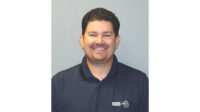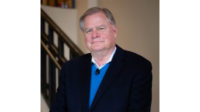Name: Stan Allen
Title: President
Company name: Northeastern Supply Co.
Number of locations: 37, plus a distribution center
Number of employees: 325
Year founded: 1945
Main lines: Mitsubishi Electric, American Standard, Mueller, AprilAire, Nortitz
Stan Allen leverages an economics degree, lessons learned as a standout high school and college linebacker, and 35 years in distribution to lead Northeastern Supply Co., a Baltimore-based HVACR and plumbing wholesaler.
A 77-year-old company, owned by the same family for more than 50 years, Northeastern serves a five-state region. Allen, who earned his degree from Lock Haven University in Pennsylvania, which he attended on a football scholarship, came to the company in 2018 after five years in the Dallas-Fort Worth area with Morrison Supply Co., where he was vice president of operations and later, president.
Before that, he held a variety of sales and management positions at Ferguson Enterprises, his jobs taking him around the country, including to Atlanta, Miami, and Los Angeles, among other cities. Allen has completed several post-graduate business programs, including at Harvard University and the International Institute for Management Development (IMD) in Lausanne, Switzerland.
Distribution Trends met with Allen via Zoom to discuss his career, how Northeastern has met recent challenges in HVACR wholesaling, his business influences, and how what he learned on the gridiron applies to running a wholesaling business. The conversation has been edited for length and clarity.
DT: You’ve been all over the country with different HVAC jobs. What motivated you to get into HVAC and how did you get started?
Allen: All those moves have been plumbing, up until 2008.
I worked for Ferguson right out of college and Ferguson started expanding, buying up a lot of HVAC companies to add on, to diversify more. So they asked me in ‘08 to take over their HVAC division for the whole country.
And I didn’t know much about HVAC at the time. But our president said, “Hey, you have the skill set. You know Ferguson, you know our system. … If you can’t fix HVAC, nobody can.”
I didn’t know how to spell it (chuckles) if you spotted me the “H.” So that’s how I got in it in ’08, started learning the HVAC side of it.
DT: Did you know you were going into distribution before you graduated or did it just work out that way?
Allen: Where I thought I was going was to the NFL because I tried out for the Steelers. I was a free agent. I was in camp for a week and when they told me I was good but not good enough, I had to move on.
But I’d been interviewing and I worked at Ferguson during my college summer breaks because I come from a plumbing contracting background. My family is in the plumbing contracting business in Virginia Beach, Virginia. I didn’t want to work on that side of business.
I interviewed with (Ferguson) as I was trying out for the Steelers. … I liked it. I guess you’d say the industry was in my blood, the wholesale distribution business. That’s sort of how it evolved.
DT: Before you came to Northeastern, what was the most instructive or formative professional experience, something that challenged you or changed you somehow?
Allen: During Ferguson, they really invested in their senior leaders. I had a chance to go to Darden Business School at University of Virginia. I got an opportunity to go to Harvard and go through their AMP (advanced management) program. I had a chance to go to IMD over in Switzerland.
What I liked is we didn’t really talk about our industry. We talked about, you know, business scenarios, business cases — just challenging (us) and doing a lot of things in that nature to get us to think differently. Because you can get caught up in your world and not think any differently. Those were pretty transformational and challenged me.
DT: There have been a lot of problems in the economy, in most industries, in recent years, with COVID and supply chains (snags), workforce issues, inflation. How have you at Northeastern been able to weather the difficult times?
Allen: There’s nothing like it, right? None of us experienced a pandemic before. Our accountant one day asked me, he said, “Hey, you’ve been in the industry a long time. What in your playbook are you using?” Like wow, I’ve actually had to create a new playbook because none of this has really been played out.
We’ve had times in the last 35 years that I’ve been in the industry that were — there’ve been shortages maybe on a few different products. Maybe there’s been a resin shortage — hurricane hit the Gulf. They were isolated, but they weren’t the magnitude we’ve dealt with in the last two years.
So I think you take all those experiences and really say, “Okay, let’s back up. Let’s not panic. What do we need to do as far as expense control? Keeping our people positive? How do you navigate through it, how do you continue to work hard?”
And then you had the pandemic and you had to protect your people, you had to protect your customers. So we followed the CDC rules, and we followed Johns Hopkins (University), and we really didn’t listen to the news (chuckles). We positioned our counters in our buildings at the 6-foot distancing, all the things you know about, hand-washing.
But what we didn’t do, which a lot of our competitors did, is we didn’t shut down where you couldn’t come in our buildings. We shut down traffic through our offices, but not the counter, because customers want some normalcy.
So we didn’t do curbside only. We tried to keep business as normal as possible through it all. And we stayed aggressive. We stayed aggressive at trying to stay ahead of allocations, to have the right inventory. Used to be “just in time” before the pandemic; now it’s “just in case.” You had to have it just in case versus just in time.
And I’m very proud of our team. We’re hardworking, we know how to take care of the customer, and we don’t back down. We never missed a delivery.
DT: What lessons did you learn in football that you can apply to your professional life and your approach to managing Northeastern?
Allen: Well, first and foremost, teamwork, being a good team member, and doing your job to the best of your ability. And then, I think it comes down to adversity, resiliency, how to handle those things, and the life lessons you do learn in sports.
I think you learn it from all sports — a lot of that commitment, dedication, heartache. The pain coming back from — it can be either injury, or a big loss, or all those kinds of things. So I think it really challenges you in all those ways to deal with business, because it’s the same thing: Adversity. Setbacks. Things you’ve got to deal with. … That’s what I really gained from football.
Then, your leadership. You develop that over time from those experiences.
DT: Who in the business world, outside of HVAC, influenced you the most? And you can name a couple people if you want to.
Allen: I think a guy named Larry Stoddard. And then a gentleman who just passed away a couple months ago, Charlie Banks. They were pretty influential. They were not in the HVAC side, they were in the plumbing side, but they were just smart, educated, thought-forward-type guys that really kept you grounded, rooted, challenged you.
DT: Were they both with Ferguson?
Allen: Yes, sir. Yep.
DT: And what were their positions?
Charlie was president of the company, president and CEO of Ferguson at one time. Larry Stoddard was a vice president, regional manager.
DT: So if you weren’t running a distribution company, what would be your fantasy career, however realistic or unrealistic? And I’ve got an inkling of what you might say here.
Allen: I’m ready for you. It’s not a football coach. Did you see the movie “Draft Day”? Kevin Costner?
DT: No. …
Allen: I call it general manager. Vice president, general manager. Running a football team, or sporting team. I would have really liked to be able put together a team, draft, trade, you know, do all that stuff, and build a team and win championships. I always said I missed my calling. Instead of selling toilets and air conditioners, I should have been running a sports team.
Any sports team, I think, the concepts are similar. It’s recognizing talent. It’s putting together a leadership team as far as coaches and the front office. … Think about it: Sports teams are a business no different than what I’m doing.
DT: I’m thinking Billy Beane and “Moneyball.”
Allen: Yeah, exactly. I’ve read that book. It’s neat how he’s done that. He’s taken a different model and done pretty well with it.








